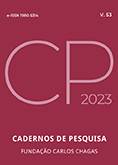Before teaching to read: Reading metacognition and teacher training
Keywords:
Reading, Learning processes, Students to teachersAbstract
The present work shows a cross-sectional, exploratory study aimed at evaluating the metacognition awareness in reading of future teachers, a strategic group for understanding the teaching of reading in the present and in the immediate future. With this objective, 252 preservice teachers completed the validated Metacognitive Awareness of Reading Strategies Inventory (MARSI) questionnaire. The results indicate that these future teachers prefer using problem-solving strategies. Statistically significant differences were found, according to degree (Early Childhood or Elementary Education) and gender (women used more support strategies for reading). Finally, the importance of taking metacognitive learning identity into account in updating the reading training of preservice teachers is valued.
Downloads
References
Al-Dawaideh, A. M., & Al-Saadi, I. A. (2013). Assessing metacognitive awareness of reading strategy use for students from the Faculty of Education at the University of King Abdulaziz. Mevlana International Journal of Education, 3(4), 223-235. https://www.acarindex.com/dosyalar/makale/acarindex-1423908837.pdf
Applegate, A., & Applegate, M. D. (2004). The Peter Effect: Reading habits and attitudes of preservice teachers. The Reading Teacher, 57(6), 554-563. https://www.researchgate.net/publication/290841345_The_Peter_Effect_Reading_habits_and_attitudes_of_preservice_teachers
Armbruster, B., Brown, A., & Baker, L. (1986). The role of metacognition in reading and studying. In J. Orasanu (Ed.), Reading comprehension: From research to practice (pp. 49-76). Erlbaum.
Armbruster, B., Echols, C., & Brown, A. (1983). The role of metacognition in reading to learn: A developmental perspective. Reading Education Report, (40), 1-30. https://eric.ed.gov/?id=ED228617
Baker, L., & Brown, A. (1984). Metacognitive skills and reading. In P. D. Pearson, R. Barr, M. L. Kamil, & P. Mosenthal (Eds.), Handbook of reading research (pp. 353-394). Longman.
Burón, J. (1993). Enseñar a aprender. Introducción a la metacognición. Mensajero.
Chutichaiwirath, K., & Sitthitikul, P. (2017). The metacognitive awareness of reading strategies in Thai EFl learners. Journal of Nusantara Studies, 2(2), 1-14. https://doi.org/10.24200/jonus.vol2iss2pp1-14
Cohen, J. (1988). Statistical power analysis for behavioral sciences. Erlbaum.
Díez, A., & Gutiérrez, R. (2020). Introducción. In A. Díez, & R. Gutiérrez (Coords.), Lectura y dificultades lectoras en el siglo XXI (pp. 11-13). Octaedro.
Echevarría Martínez, M. A., & Gastón Barrenetxea, I. (2000). Dificultades de comprensión lectora en estudiantes universitarios. Implicaciones en el diseño de programas de intervención. Revista de Psicodidáctica, (10), 59-74. https://www.redalyc.org/articulo.oa?id=17501006
Felipe, A., & Barrios, E. (2017). Evaluación de la competencia lectora de futuros docentes. Investigaciones sobre lectura, (7), 7-21. https://doi.org/10.24310/revistaisl.vi7.10978
Field, A. (2018). Discovering statistic using SPPS. Sage
Flavell, J. (1979). Metacognition and cognitive monitoring: A new area of cognitive-developmental inquiry. American Psychologist, 34(10), 906-911. https://doi.org/10.1037/0003-066X.34.10.906
Flores Guerrero, D. (2016). La importancia e impacto de la lectura, redacción y pensamiento crítico en la educación superior. Zona Próxima, (24), 1-10. http://www.scielo.org.co/scielo.php?script=sci_arttext&pid=S2145-94442016000100010
Garner, R. (1988). Metacognition and reading comprehension. Ablex Publishing Corporation.
Gordon, C. J., & Braun, C. (1985). Metacognitive processes: Reading and writing narrative discourse. In D. Forest-Pressley, G. MacKinnon, & T. G. Waller (Eds.), Metacognition, cognition and human performance (pp. 1-75). Orlando Academic Press.
Granado, C. (2014). El docente como lector: Estudio de los hábitos lectores de los futuros docentes. Cultura y Educación, 26(1), 44-70. https://doi.org/10.1080/11356405.2014.908666
Iwai, Y. (2016). Promoting strategic readers: Insights of preservice teachers’ understanding of metacognitive reading strategies. International Journal for the Scholarship of Teaching and Learning, 10(1), Article 4. https://doi.org/10.20429/ijsotl.2016.100104
Larrañaga, E., Yubero, S., & Cerrillo, P. (2008). Estudio sobre los hábitos lectores de los universitarios españoles. CEPLI/Fundación SM.
Madhumathi, P., & Ghosh, A. (2012). Awareness of reading strategy use of Indian ESL students and the relationship with reading comprehension achievement. English Language Teaching, 5(12), 131-140. https://doi.org/10.5539/elt.v5n12p131
Martín Ezpeleta, A., & Echegoyen Sanz, Y. (2020). La percepción de la metacognición lectora en el grado de maestro: Un estudio de caso. In A. Díez, & R. Gutiérrez (Coords.), Lectura y dificultades lectoras en el siglo XXI (pp. 177-191). Octaedro.
Mayoral, S., Timoneda, C., & Pérez, F. (2013). Evaluación de los procesos metacognitivos en estudiantes de grado en maestro de educación infantil y primaria en tareas de lectura. Aula Abierta, 41(3), 5-12.
Mokhtari, K., & Reichard, C. (2002). Assessing students’ metacognitive awareness of reading strategies. Journal of Educational Psychology, 94(2), 249-259. https://doi.org/10.1037/0022-0663.94.2.249
Munita, F. (2018). El sujeto lector didáctico: Lectores que enseñan y profesores que leen. Álabe, (17). http://doi.org/10.15645/Alabe2018.17.2
Organización para la Cooperación y el Desarrollo Económicos (OCDE). (n.d.). El programa PISA de la OCDE. Qué es y para qué sirve. OCDE. https://www.oecd.org/pisa/39730818.pdf
Paris, S., & Byrnes, J. (1989). The constructivist approach to self-regulation and learning in the classroom. In B. Zimmerman, & D. Schunk (Eds.), Self-regulated learning and academic achievement: Theory, research and practice (pp. 169-200). Springer.
Pressley, M., & Afflerbach, P. (1995). Verbal protocols of reading: The nature of constructively responsive reading. Lawrence Erlbaum Associates.
Solak, E., & Altay, F. (2014). The reading strategies used by prospective English teachers in Turkish ELT context. International Online Journal of Education and Teaching, 1(3), 78-89. https://eric.ed.gov/?id=ED553411
Published
How to Cite
Issue
Section
License
Copyright (c) 2023 Cadernos de Pesquisa

This work is licensed under a Creative Commons Attribution-NonCommercial 4.0 International License.
Authors who publish in this journal agree to the following terms:
a. Authors retain the copyright and grant the journal the right to first publication, with the paper simultaneously licensed under the Creative Commons Attribution license that allows the sharing of the paper with acknowledgment of authorship and initial publication in this journal.
b. Authors are authorized to assume additional contracts separately, for non-exclusive distribution of the version of the paper published in this journal (for example publishing in institutional repository or as a book chapter), with acknowledgment of authorship and initial publication in this journal.
c. Authors are allowed and encouraged to publish and distribute their paper on-line (for example in institutional repositories or on their personal page) at any moment before or during the editorial process, as this can generate productive changes, as well as increase the impact and citation of the published paper (See The Effect of Open Access).









